Podcast
Questions and Answers
What does Information Technology (IT) utilize for the storage, processing, and transmission of data?
What does Information Technology (IT) utilize for the storage, processing, and transmission of data?
- Communication devices
- Manual methods
- Paper records
- Digital technologies (correct)
What is the purpose of invoicing software?
What is the purpose of invoicing software?
To simplify the task of sending bills to customers.
What is customer retention?
What is customer retention?
A measure/rate of how many customers stay with a company for the long term.
What does the Human Resources department manage?
What does the Human Resources department manage?
What is payroll?
What is payroll?
What does it mean if a process is described as seamless?
What does it mean if a process is described as seamless?
What is the role of a database administrator?
What is the role of a database administrator?
What does the term 'to automate' refer to?
What does the term 'to automate' refer to?
What is a platform in the context of software applications?
What is a platform in the context of software applications?
What is the Internet of Things (IoT)?
What is the Internet of Things (IoT)?
What do Customer Relationship Management (CRM) Systems do?
What do Customer Relationship Management (CRM) Systems do?
What does the CPU stand for?
What does the CPU stand for?
What is a Learning Management System (LMS)?
What is a Learning Management System (LMS)?
What is a Helpdesk Supervisor responsible for?
What is a Helpdesk Supervisor responsible for?
Flashcards are hidden until you start studying
Study Notes
Information Technology (IT)
- IT involves the use of digital technologies for data storage, processing, and transmission.
Invoicing
- Invoicing refers to the process of sending bills to customers.
Customer Retention
- Customer retention measures the long-term loyalty of customers to a company.
Human Resources
- Human Resources is a department that manages employee relations and benefits.
Payroll
- Payroll refers to the list of employees and their corresponding salaries or payments.
Seamless
- Seamless signifies something that is perfectly smooth and continuous.
Server
- A server is a device, computer, program, or system that manages network resources and provides data to other computers.
Streamline
- Streamlining involves making processes more efficient and effective by eliminating unnecessary parts.
Automate
- Automation refers to converting a process to be performed by machines.
Informed Decision
- An informed decision is based on a thorough understanding and knowledge of the situation.
Platform
- A platform is an operating environment for software applications.
Virtual
- Virtual refers to something done or accessed via a computer or electronic device.
Groundbreaking
- Groundbreaking implies the introduction of new ideas or methods.
Feedback Loops
- Feedback loops are circuits that feed back a portion of the output to the input.
Internet of Things (IoT)
- The Internet of Things (IoT) refers to a network of physical objects or devices equipped with sensors that can communicate with each other over the internet.
IT Infrastructure
- IT infrastructure encompasses the networks and systems that support IT operations.
- This includes hardware and software resources for IT services.
Database Administrator
- A database administrator (DBA) designs, develops, and maintains databases.
Software Developer
- A software developer writes software for company computers.
Helpdesk Supervisor
- A helpdesk supervisor oversees a team of technical support professionals who assist IT users with troubleshooting technical problems.
Support Technician
- A support technician manages computer infrastructure within a company. Their responsibilities include setting up new computers, installing software, diagnosing technical issues, and resolving them.
Project Manager
- A project manager plans projects and ensures they are delivered on time and within budget.
Systems Analyst
- A systems analyst determines the specific requirements for software needed by a company.
Security Monitoring
- Security monitoring involves continuously observing and analyzing security events within a system to detect threats, verify security controls, identify vulnerabilities, maintain a legal record of activities, and facilitate forensic investigations.
Server Upgrade
- A server upgrade usually involves backing up data, installing the new operating system, and then restoring the data.
Online Portals
- Online portals are web-based platforms that aggregate information from diverse sources into a single user interface, presenting users with the most relevant information for their specific context.
Telemedicine/ Telehealth
- Telemedicine or telehealth utilizes telecommunications technology for remote diagnosis and treatment of patients.
Health Information Exchange (HIE) Systems
- Health Information Exchange (HIE) systems enable the electronic exchange of healthcare information between organizations within a region, community, or hospital system.
Electronic Health Records (EHRs)
- Electronic Health Records (EHRs) are electronic versions of patient medical histories maintained by healthcare providers over time.
Business Intelligence (BI) Tools
- Business Intelligence (BI) tools are proprietary or open-source software applications used to collect, process, and analyze large amounts of structured and unstructured data from internal and external systems.
Customer Relationship Management (CRM) Systems
- Customer Relationship Management (CRM) systems manage all interactions between a company and its current and potential customers.
Enterprise Resource Planning (ERP) Systems
- Enterprise Resource Planning (ERP) systems are software systems that help organizations streamline their core business processes, including finance, HR, manufacturing, supply chain, and sales.
CPU
- The CPU (Central Processing Unit) is the main chip in a computer.
Learning Management System (LMS)
- An LMS is a software tool that manages all aspects of online learning. It allows for the creation, planning, organization, scheduling, delivery, and reporting of educational content, including training courses and programs.
Human Machine Interface (HMI)
- An HMI is a component or feature of a device or software application that enables humans to interact with machines.
IT Specialist
- An IT specialist is an expert who sets up, maintains, and repairs computers and digital networks.
IT Department
- The IT department is responsible for managing and supporting all aspects of technology within a company.
Studying That Suits You
Use AI to generate personalized quizzes and flashcards to suit your learning preferences.



